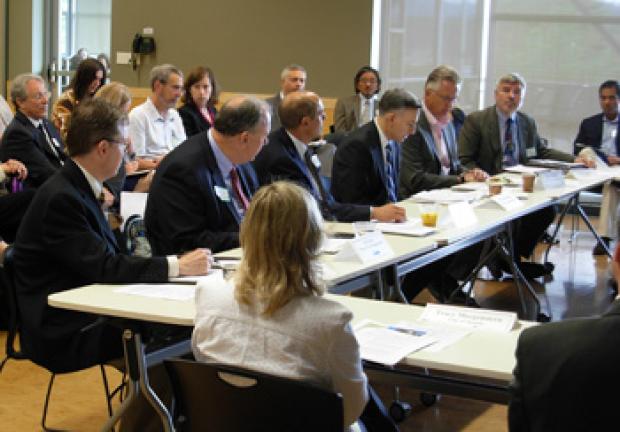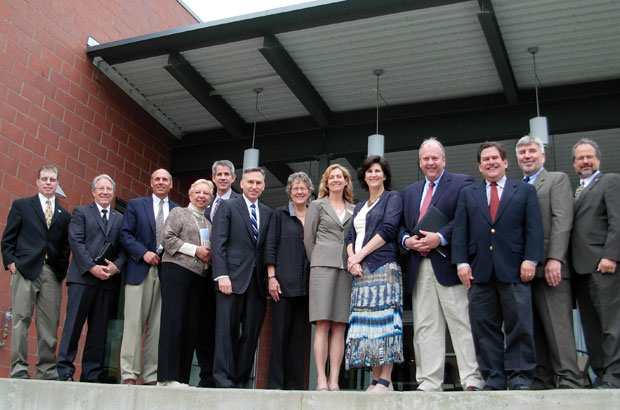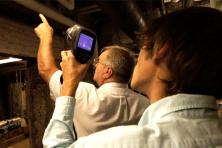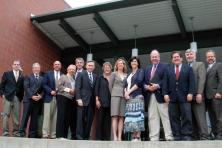With Congress unwilling to take concerted action on climate change, it's worth celebrating that county and city leaders in the Northwest are up to the task of climate leadership at the regional scale.
On July 23, King County’s Growth Management Planning Council voted unanimously to adopt ambitious, countywide greenhouse gas reduction targets. King County is the 13th most populous county in the country, and a zone responsible for 25 percent of Washington State’s carbon emissions. The new emissions reduction targets are the result of six months of intense deliberation among the governmental members of the King County-Cities Climate Collaboration and the Sound Cities Association.
“Our state and our region are national leaders in addressing the most important issue of our lifetime,” said King County Executive Dow Constantine moments before the vote was taken. “We have the opportunity to present a new model for regional collaboration with a shared countywide target, one that aligns with best available science to avoid the most dangerous impacts of climate change.”
Collaboration is the Name of the Game

Washington State’s 1990 Growth Management Act requires counties and cities to collaborate on framework policies that guide comprehensive planning for all jurisdictions. The GMPC is where the planning rules are made for the county and the 39 cities within its boundaries.
The motion the GMPC passed calls for the county and cities to reduce countywide sources of greenhouse gas emissions (GHG), compared to a 2007 baseline by 25% by 2020, 50% by 2030, and 80% by 2050; assess countywide GHG emissions at least every two years; and update the county’s GHG inventory at least every five years.
“This is a great step forward and I am proud to be part of a state that is taking steps to address climate change,” Seattle City Councilmember Mike O’Brien, “We may not have exact answers but without setting these goals, we will never get there.”
The King County-Cities Climate Collaboration is a voluntary group of nine cities and King County that formed in 2011 to support one another in taking climate action. Together, these regional governments are developing a set of actions to achieve the ambitious targets that are tailored to each city’s particular needs, adopting national best practices for carbon reduction in buildings, transportation and land use, and energy supply.
The unanimous GMPC vote follows two summits convened by Executive Constantine and Mercer Island Mayor Bruce Bassett on February 13 and June 12 and attended by mayors and city councilmembers of 13 cities, which represents 70% of the county’s population.
Standing Tall and Firm on Climate
This is not the first time that King County’s elected leaders have stood up for climate action. On January 16, 2012, Executive Constantine penned a strong letter questioning plans to ship coal from Montana to China through Washington’s ports and calling for a full environmental assessment to thoroughly analyze the “significant adverse impacts” of the proposed Gateway Pacific Terminal project.
On July 21, 2013, King County and the cities of Issaquah, Kirkland, Redmond, Renton, and Snoqualmie requested that Puget Sound Energy (PSE) “more fully incorporate environmental, public health, and financial impacts and risks of continued reliance on on coal-produced electricity, most notably at Colstrip, where PSE is the largest owner.”
Five months later on December 5, 2013, the county and the cities of Issaquah, Kirkland, Mercer Island, Sammamish, Seattle, Shoreline, Snoqualmie, and Tukwila expressed strong support to Governor Jay Inslee and the members of the Climate Legislative and Executive Workgroup for bold action on climate in the Washington State Legislature.
King County’s current actions also track closely Governor Jay Inslee’s April 29, 2014 Executive Order to reduce carbon pollution and improve energy independence through clean energy in Washington, as well as the strategy to take action on climate and energy initiated by the governments of California, British Columbia, Oregon, and Washington on October 28, 2013.
At this pivotal moment when Washington Governor Jay Inslee is preparing climate framework policies to cap and price carbon and create a Clean Fuels Standard in 2015, local political leadership has stepped forward boldly standing fast with ambitious targets to reduce carbon pollution.
“We don’t have all of the answers on this issue but this is the most important issue we will deal with in our lifetime,” said King County Council Chairman Larry Phillips, speaking in support of the motion. “Leadership here is looking forward and figuring out how to meet the future for our children and grandchildren and all who will come after us.”




